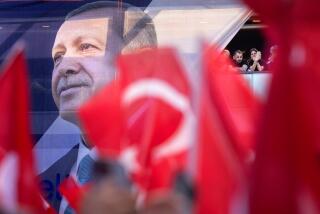Turkish Premier to Begin U.S. Visit : Diplomacy: Tansu Ciller is a symbol of political renewal in her fractious nation.
- Share via
ANKARA, Turkey — Dynamic Tansu Ciller is like the country she leads--in a hurry but often late. She is a smiling image of a young Turkey racing toward prosperous democracy on a highway pocked by old obstacles and disconcerting side tracks.
Ciller, the first female prime minister of Muslim Turkey, arrives in Washington today to begin a state visit that will include President Clinton’s first encounter with the leader of a sturdy American ally wedged in a triangle of trouble between the Balkans, Caucasus and Middle East.
A 47-year-old former economics professor, Ciller came to power in June on the same platform as Clinton: She is a symbol of political renewal who knows that it’s the economy, stupid. Ciller visits Capitol Hill today and goes to the White House on Friday on an inaugural American visit as prime minister that will also take her to New York and Boston.
Beyond the substance of her stay, the forceful prime minister will undoubtedly improve the public image of a country whose marked economic and social progress in the past decade has often been masked by brutal human rights abuses.
After a rocky start that has left her much to prove, the U.S.-educated Ciller now seems to have established her credentials as leader of her fractious nation of 60 million. “I embrace you with a mother’s love,” is the trademark refrain of this mother of two. “Ciller,” which means “freckles” in Turkish, is pronounced “chiller.”
In talks with Administration officials, Ciller is expected to complain about the costs of Turkey’s unflagging support of U.N. sanctions against neighboring Iraq.
Turkey says it has lost $7 billion to $10 billion in trade with Iraq in implementing the U.N. sanctions. Millions of barrels of oil still slosh in a pipeline from neighboring Iraq to the Mediterranean, a pipeline that Turkey shut down within days of Iraq’s invasion of Kuwait in 1990. Turkey would like to drain it and use the oil money, partly to service a $2-billion debt owed it by Iraq.
As Ciller will make plain in Washington, Russia also bulks large in the Turkish gaze. While the United States sees Russia’s role in the former southern republics of the Soviet Union as a bulwark against anarchy, Turkey sees a dangerous resurgence of Russian imperialism. That preoccupation may translate into Turkish requests for American military hardware.
American aid coffers are dry, but by all odds, Ciller will get a sympathetic hearing: NATO member Turkey, which sees itself as an island of democratic pragmatism, is still America’s staunchest friend in a tough neighborhood.
At home, Ciller is still struggling to fill the gap left last April by the death of President Turgut Ozal. Prime Minister Suleyman Demirel moved to the presidency. Ciller, who had been the minister responsible for implementing economic policy, replaced Demirel as prime minister after winning a leadership election within their ruling True Path Party.
Ciller, a Muslim who liked one magazine portrayal of her as Joan of Arc well enough to hang it in her home, is a risk-taker. She also has catholic tastes, for on her coffee table one summer’s day a Turkish journalist reported seeing a tome examining Attila the Hun’s leadership techniques.
As Ciller left Ankara on Wednesday night, she left the Turkish press in a furor over whether she had suggested that Turkey might look toward the Spanish system of decentralized regionalism to answer demands for autonomy by Turkey’s 12 million Kurds. The editors of Turkey’s three major newspapers all swear they heard her say it might be an idea worth pursuing. Ciller denies saying anything of the sort.
Learning on the job has led Ciller to a frenzied pace. She is never on time, arriving late even for her own Cabinet meetings. Her daily agenda is a movable feast. Aides often do not know her program from one hour to the next.
Turkey’s impressive drive toward modernization in recent years has sometimes been a ballet of three giant steps forward followed by one embarrassing step back.
The Turkish economy, for example, is growing at an astonishing 12% this year, by far the highest rate in Europe. Yet while Turkey is closing the economic gap toward hoped-for membership in the European Community, that same booming economy is burdened with more than 60% inflation this year--many times higher than the EC average. The government’s 1993 budget deficit will be double what was officially anticipated.
Special correspondent Hugh Pope in Istanbul contributed to this report.
More to Read
Sign up for Essential California
The most important California stories and recommendations in your inbox every morning.
You may occasionally receive promotional content from the Los Angeles Times.













